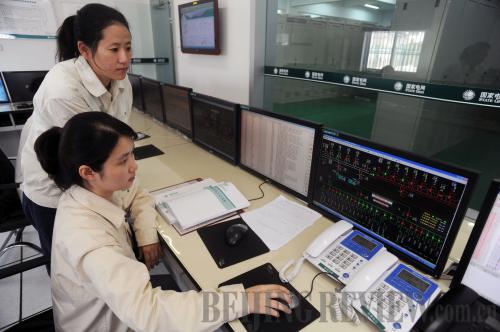|
 |
|
DOUBLE CHECKING: Technicians at a power grid company use hi-tech facilities to supervise operations on September 30 in Feidong County, Hefei in Anhui Province (WANG LEI) |
"After the tiered pricing system is adopted, households whose power consumption falls below the first level will not feel much difference in terms of electricity expenses. But those who use more power will have to pay more and they might be motivated to use less electricity," Cao said.
The ultimate goal for energy conservation and emission reduction is to secure a sustainable growth of economy and society. Therefore, "each one of us will be the beneficiary of the tiered pricing system," he said.
More power, more profit?
There are more than 2,000 power companies in China, 55 of which are listed companies. However, an overwhelming 90 percent of electricity is supplied by the big five state-owned power companies, including China Huaneng Group, China Guodian Corp., China Power Investment Corp., China Huadian Corp. and China Datang Corp. In addition, electricity sales are controlled by the big six power grids, including East China Grid Co. Ltd., China Southern Power Grid Corp. Ltd., North China Grid Co. Ltd., Central China Grid Co. Ltd., Northeast China Grid Co. Ltd. and Northwest China Grid Co. Ltd.
Figures from the National Energy Administration showed household power consumption in 2009 stood at 457.1 billion kwh, accounting for 12.55 percent of all social power consumption. If the tiered pricing system is adopted, an increment of tens of billions of yuan will be generated whether scheme No. 1 or scheme No. 2 is adopted.
Cao said part of the increment resulting from the price hike will be used for the following three aspects.
First, it will be used to offset rising environmental protection cost of the power and grid companies. Currently, thermal power plants generate half of all sulfur dioxide emissions and are the major source of air pollution in China. To reduce emissions of sulfur dioxide, the power companies have installed desulfuration facilities which help reduce sulfur dioxide emission. They need to be reimbursed, Cao said. And the rising power prices will urge them to take more effective measures to contain carbon emission.
Second, the money will be used to replace household electricity meters. At present, households should pay for electricity meter replacements. But after the tiered pricing system is adopted, grid companies will no longer be allowed to charge households for the replacement.
Third, the recent price surge of electricity coal endangers thermal power plants whose costs are on the rise. The rise in electricity cost can help save the power companies and secure normal power supply.
Residents' response
Figures from the NDRC show considerable differentiation in the urban and rural household monthly electricity consumption. In 2009, average urban household electricity consumption was about 140 kwh a month, while that of the rural areas was just 60 kwh. It's no surprise then that the NDRC's request for comments has mostly caught the attention of urban residents.
"I support this motion. People who use more should pay more. And this will urge people to save energy and live a low energy consuming life," said Zhang Changquan, a Beijing resident.
Zhang said he had a habit of turning off the electricity when it was unnecessary, and family members who forgot to do so would get an "earful."
But some people are against the proposal. "It's just another price hike in the disguise of reform and energy conservation," said Wang Weihan, an energy expert at the University of International Business and Economics.
Wang said the prerequisite for an electricity price hike is strict cost supervision and calculation. "As a monopolistic industry, power companies must be supervised, which is the basic requirement for maintaining their status as a monopoly. Otherwise, no one can be sure about whether their costs have indeed increased or not," said Wang.
Wang said from the perspective of policymakers, they are merely concerned about the energy conservation indexes. But as for ordinary citizens, their appeal to maintain their current livelihoods should always come the first. Water, gas and electricity are the daily necessities—and they are paying close attention to the price hikes of those public goods.
China's Electricity Production and Sales
From January-August 2010, total social power consumption in China stood at 2.794 trillion kwh, up 19.34 percent year on year. Among that, industrial electricity consumption was 2.095 trillion kwh, growing 21.47 percent from the same period last year; urban and rural household electricity consumption stood at 335.5 billion kwh, rising 12.97 percent year on year.
During this period, a total of 196.6 billion yuan ($29.6 billion) was invested in power plants: 40.2 billion yuan ($6.1 billion) in hydropower plants; 73.6 billion yuan ($11.1 billion) in thermal power plants; 35.9 billion yuan ($5.4 billion) in nuclear power plants; and 46 billion yuan ($6.9 billion) in wind power plants.Newly increased power production stood at 471.3 mw; hydropower production at 950 mw, down 7.3 percent year on year; thermal power production at 329.1 mw, up 21.8 percent year on year; and wind power at 454 mw, up 27.6 percent year on year.
(Source: National Energy Administration)
| 